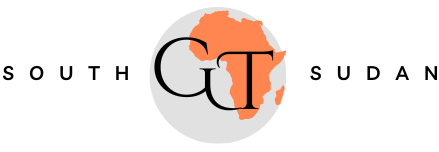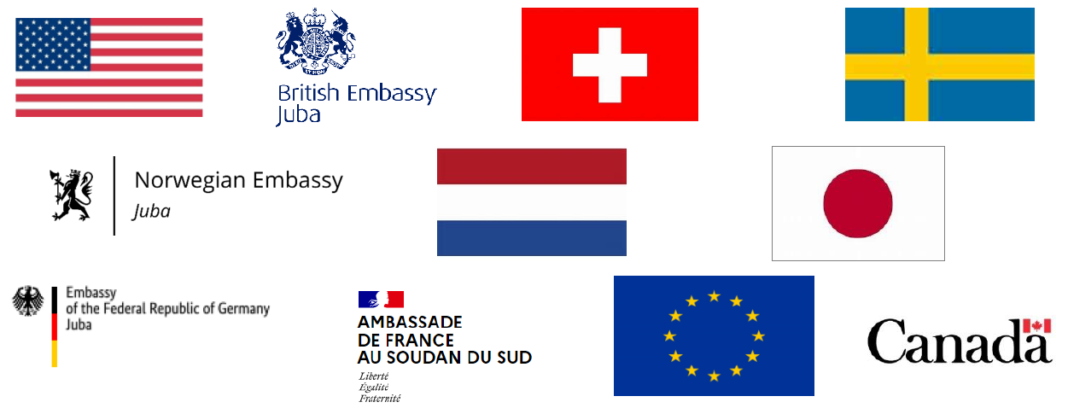At least 9 million out of 12 million people in South Sudan are in urgent need of humanitarian aid—the UN says.
Embassies of Canada, the European Union, France, Germany, Japan, the Netherlands, Norway, Sweden, Switzerland, the United Kingdom, and the United States of America urged the transitional government of South Sudan to immediately halt recent actions that have imposed illicit and unacceptable costs on donor governments, United Nations agencies, and their implementing partners who are seeking to provide humanitarian assistance in South Sudan.
In a joint statement extended to Golden Times, the embassies stated that the current actions of South Sudan’s government imposing costs on humanitarian assistance, including the e-Petroleum Accreditation Permit, customs fees, and charges, the electronic cargo tracking note, the laboratory test on food rations, and the security escort fee, are affecting their efforts to delivery critical lifesaving relief assistance to South Sudan.
“Such attempts are contrary to international practice and to South Sudanese law,” the statement partly read, “which clarifies that the United Nations, UN specialized agencies, diplomatic missions, or other international donors and their contractors, grantees, and implementing partners in South Sudan are exempt from excise duties, customs duties and fees, and other taxes, charges, and fees on goods and services directly related to diplomatic missions or donor-funded projects.”
“When the transitional government imposes such costs, it is diverting life-saving aid from South Sudanese people in need. It is the obligation of the transitional government to reduce the costs and risks faced by those seeking to provide humanitarian assistance to its people,” the statement read.
A few days ago, the United States Ambassador Michael Adler met the Minister of Foreign Affairs and International Cooperation James Pitia Morgan and discussed the importance of reducing the costs of providing aid assistance including the elimination of duties, taxes, and fees imposed on aid agencies in the country.
“We discussed the importance of reducing the costs of providing assistance in South Sudan; this included the immediate elimination of duties, taxes, and fees on those providing humanitarian assistance to help the people of South Sudan. These include the United Nations, UN specialized agencies, diplomatic missions, and the contractors,” Adler told the media shortly after meeting the foreign minister.
According to the United Nations, 9 million out of the 12 million people in South Sudan require humanitarian assistance. The conflict in Sudan adds more burden on South Sudan as the number of refugees and returnees crossing the border keeps rising every day.
Anita Kiki Gbeho, the Deputy Special Representative of the UN Secretary-General and Humanitarian Coordinator, said the taxes levied on the humanitarian agencies affects the delivery of urgent relief assistance to the needy in South Sudan.
Speaking to the media after meeting the first vice president on Friday-19, Anita Kiki said the United Nations is planning to deliver humanitarian assistance to 6 million people in several parts of South Sudan; the rising cost of delivering aid could frustrate the efforts.
“I took the opportunity to advocate around the issue of taxation to ensure that humanitarian assistance can enter the country without being taxed. 2024 is a critical year for South Sudan. We have a protracted crisis that we have been trying to address. Out of 12 million, 9 million people are said to need some form of assistance. With that 9 million people, as the humanitarian community, we are targeting 6 million, and on top of that, we have the war or the conflict in Sudan which has put pressure on South Sudan,” Kiki said.
In a separate development, Guang Cong, the Deputy Special Representative of the UN Secretary-General on Political Affairs, lamented that the taxes levied on aid agencies are already affecting the work of the United Nations Mission in South Sudan and other UN agencies supporting vulnerable groups in South Sudan.
Speaking in a meeting with Deputy Minister of Foreign Affairs and International Cooperation, Ramadan Abdalla Goch, Guang Cong lamented that some UN agencies are already facing fuel challenges affecting the delivery of humanitarian services to the population.
“I raised the issue of levies on the fuel trucks of UNMISS and all the UN agencies and his honorable assured me that the government would take measures to address this important issue because you know without addressing the fuel issue, it is now seriously affecting the operation of UNMISS and also UN and humanitarian partners,” Cong said.
Golden Times | South Sudan




